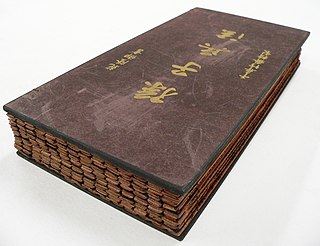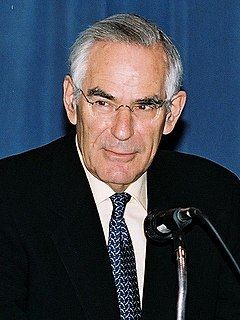1968 (MCMLXVIII) was a leap year starting on Monday of the Gregorian calendar, the 1968th year of the Common Era (CE) and Anno Domini (AD) designations, the 968th year of the 2nd millennium, the 68th year of the 20th century, and the 9th year of the 1960s decade.

The 1968 United States presidential election was the 46th quadrennial presidential election, held on Tuesday, November 5, 1968. The Republican nominee, former vice president Richard Nixon, defeated the Democratic nominee, incumbent vice president Hubert Humphrey, and the American Independent Party nominee, Alabama Governor George Wallace.

Lyndon Baines Johnson, often referred to by his initials LBJ, was the 36th president of the United States, serving from 1963 to 1969. He had previously served as the 37th vice president from 1961 to 1963 under President John F. Kennedy. A Democrat from Texas, Johnson also served as a U.S. representative, U.S. senator and the Senate's majority leader. He holds the distinction of being one of the few presidents who served in all elected offices at the federal level.

The Art of War is an ancient Chinese military treatise dating from the Late Spring and Autumn Period. The work, which is attributed to the ancient Chinese military strategist Sun Tzu, is composed of 13 chapters. Each one is devoted to a different set of skills related to warfare and how it applies to military strategy and tactics. For almost 1,500 years it was the lead text in an anthology that was formalized as the Seven Military Classics by Emperor Shenzong of Song in 1080. The Art of War remains the most influential strategy text in East Asian warfare and has influenced both Eastern and Western military thinking, business tactics, legal strategy, lifestyles and beyond.
The silent majority is an unspecified large group of people in a country or group who do not express their opinions publicly. The term was popularized by U.S. President Richard Nixon in a televised address on November 3, 1969, in which he said, "And so tonight—to you, the great silent majority of my fellow Americans—I ask for your support." In this usage it referred to those Americans who did not join in the large demonstrations against the Vietnam War at the time, who did not join in the counterculture, and who did not participate in public discourse. Nixon, along with many others, saw this group of Middle Americans as being overshadowed in the media by the more vocal minority.

David Halberstam was an American writer, journalist, and historian, known for his work on the Vietnam War, politics, history, the Civil Rights Movement, business, media, American culture, and later, sports journalism. He won a Pulitzer Prize for International Reporting in 1964. Halberstam was killed in a car crash in 2007, while doing research for a book.
Cornelius Mahoney Sheehan was an American journalist. As a reporter for The New York Times in 1971, Sheehan obtained the classified Pentagon Papers from Daniel Ellsberg. His series of articles revealed a secret United States Department of Defense history of the Vietnam War and led to a U.S Supreme Court case, New York Times Co. v. United States, 403 U.S. 713 (1971), which invalidated the United States government's use of a restraining order to halt publication.

Ronald Lawrence Kovic is an American anti-war activist, writer, and former United States Marine Corps sergeant who was wounded and paralyzed in the Vietnam War. His 1976 memoir Born on the Fourth of July was made into the Academy Award–winning 1989 film directed by Oliver Stone.

Robert Elwood Bly is an American poet, essayist, activist and leader of the mythopoetic men's movement. His best-known prose book is Iron John: A Book About Men (1990), which spent 62 weeks on The New York Times Best Seller list, and is a key text of the mythopoetic men's movement. He won the 1968 National Book Award for Poetry for his book The Light Around the Body.

We Were Soldiers is a 2002 American war film written and directed by Randall Wallace and starring Mel Gibson. Based on the book We Were Soldiers Once… and Young (1992) by Lieutenant General (Ret.) Hal Moore and reporter Joseph L. Galloway, it dramatizes the Battle of Ia Drang on November 14, 1965.

Opposition to United States involvement in the Vietnam War began with demonstrations in 1964 against the escalating role of the United States in the Vietnam War and grew into a broad social movement over the ensuing several years. This movement informed and helped shape the vigorous and polarizing debate, primarily in the United States, during the second half of the 1960s and early 1970s on how to end the war.

John B. Balaban is an American poet and translator, an authority on Vietnamese literature.
Monique T.D. Truong is a Vietnamese American writer living in Brooklyn, New York.
The Years of Lyndon Johnson is a biography of Lyndon B. Johnson by the American writer Robert Caro. Four volumes have been published, running to more than 3,000 pages in total, detailing Johnson's early life, education, and political career. A fifth volume is expected to deal with the bulk of Johnson's presidency and post-presidential years. The series is published by Alfred A. Knopf.
Barrett Tillman is an American author who specializes in naval and aviation topics in addition to fiction and technical writing.

Fred W. Halstead was the Socialist Workers Party's candidate for President of the United States in 1968. His running mate was Paul Boutelle.
The Spring Mobilization Committee to End the War in Vietnam, which became the National Mobilization Committee to End the War in Vietnam, was a coalition of antiwar activists formed in November 1966 to organize large demonstrations in opposition to the Vietnam War. The organization was informally known as "the Mobe".

In the 1960s, several "be-ins" were held in Central Park, Manhattan, New York City to protest against various issues such as U.S. involvement in the Vietnam War and racism.
1968 in the United States was marked by several major historical events. It is often considered to be one of the most turbulent and traumatic years of the 20th century in the United States.










